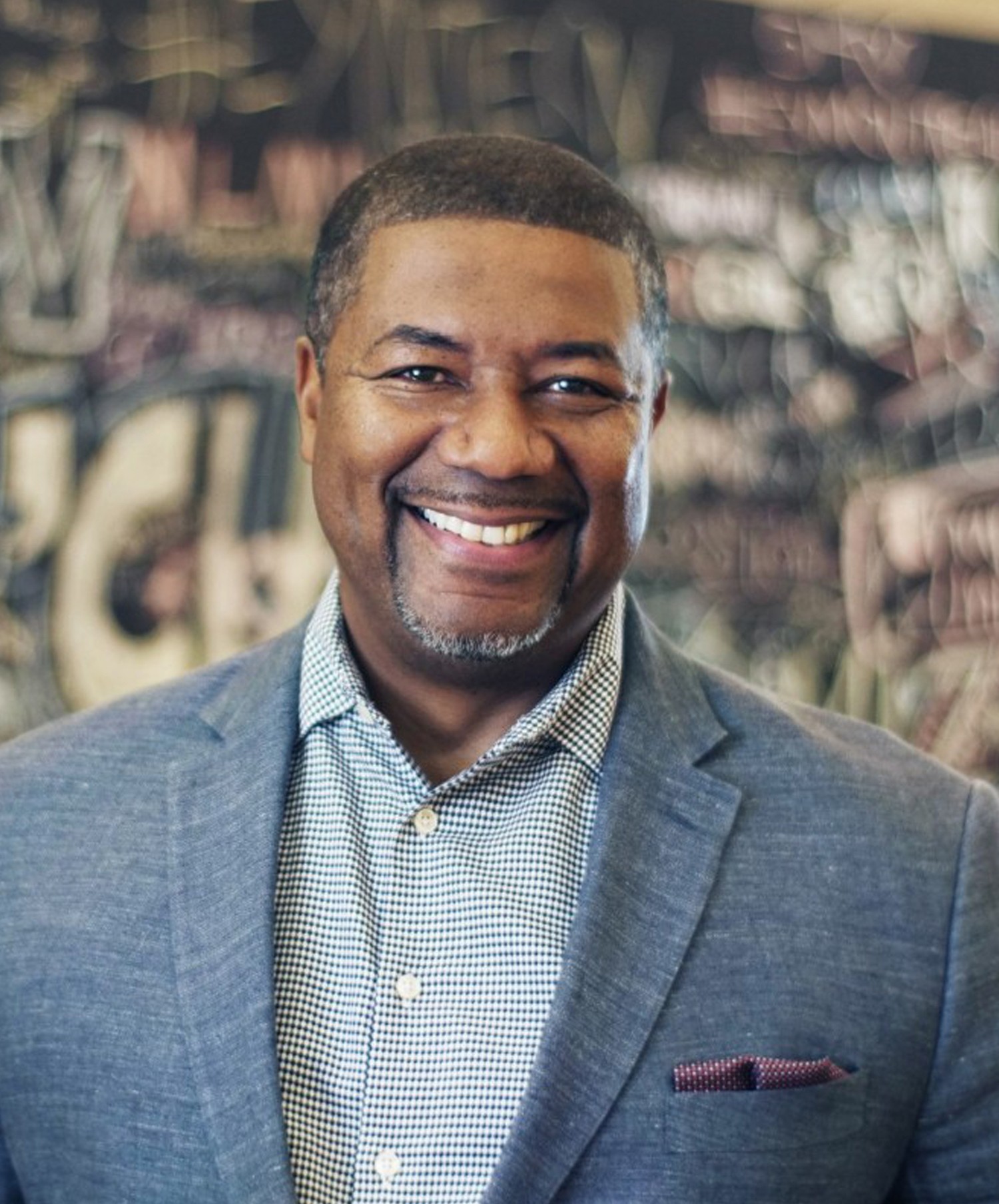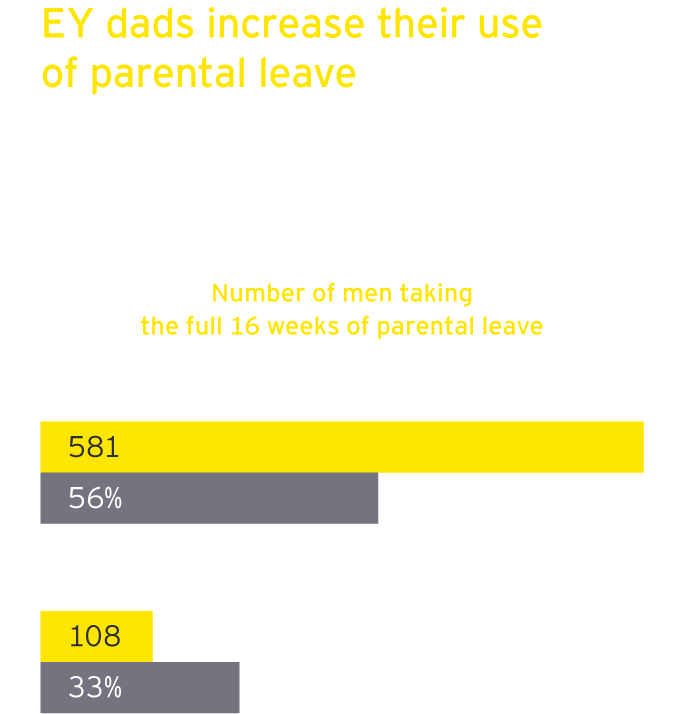We believe that our people are our most valuable resource and throughout their career journey, we invest in preparing them for success. It begins early in the career pipeline, where we provide opportunities for exposure to the professional services industry and extends into how we develop our talent and support them through major life events. By taking a comprehensive approach to addressing the varied needs of our people, we create a positive culture and increased engagement that ultimately impacts their desire to stay, contribute and thrive at EY US.
Empowering our people to succeed
EY US supports equitable opportunities for all of our people and continues to grow our diverse workforce. Over the last year, our total representation of women has remained steady with slight advancements at our senior manager and senior ranks. While overall representation of R&ED professionals has decreased by 1%, we are accelerating our progress in this area through increased focus on intentional recruiting, retention and sponsorship.
Employee workforce headcount
Senior manager
Manager
Senior
Staff
Core Business Services (CBS) — total headcount
Composed of all essential business-enablement functions, CBS helps EY deliver quality service to our clients, win in the marketplace and optimize growth and profitability.
Associate Director
Assistant Director
Supervising Associate
Senior Associate
Associate
Administrative Roles
Attracting diverse talent
Our holistic approach to inclusive recruiting includes a multifaceted sourcing strategy to build a pipeline from high school through the partner rank.
We actively recruit from Minority Serving Institutions (MSIs), including Historically Black Colleges and Universities (HBCUs), Hispanic Serving Institutions (HSIs), professional organizations and a wide array of colleges, universities and community colleges. We educate and empower our recruiters on best practices for attracting talent, engage clients in conversations about diversity recruiting and serve on the boards of many professional organizations.
And we go beyond recruiting by sharing knowledge with colleges and universities to impact their cultures of inclusiveness. Additionally, in 2021, the Ernst & Young Foundation provided over $6.8 million in scholarships for our intern programs overall. We also fund programming in the following areas: career awareness, mentoring, tutoring and equitable experiences at universities.
Our strategy is comprehensive across our on‑campus, experienced and executive recruiting efforts, and we’ve made progress, as described below:
- Racially and ethnically diverse professionals accounted for 42% of our full-time new hires from college campuses and 52% of our experienced new hires, both up 3% each from the prior year.
- Women accounted for 48% of our full-time new hires from college campuses and 40% of experienced new hires.
- Racially and ethnically diverse interns and women represented 39% and 49% of the cohort, respectively.
- Racially and ethnically diverse interns from our Launch program (an exploratory internship experience for college sophomores or juniors) and women represented 96% and 54% of the cohort, respectively.
These signature investments enhance the professional opportunities for racially and ethnically diverse students and young professionals in the marketplace, and we plan to continue this commitment as part of our DEI recruiting and strategy.

Ken Bouyer
(he/him/his)
EY Americas Director of Inclusiveness Recruiting
We believe that when differences are celebrated, talented people from all backgrounds have the chance to develop, advance and make more meaningful contributions to our culture and our clients. The ability to invite and learn from people with different perspectives is fundamental to driving innovation, building strong relationships and delivering the best approaches for our clients.
Talent attraction and acquisition focus areas
- Race and ethnicity
- Gender
- Veterans
- Disabilities
- LGBT+
Experienced hire*
Campus hire
Client-serving interns (excluding Launch program)
Launch interns
Building a talent pipeline to drive change
Enhancing opportunities for underrepresented professionals helps us improve diverse representation across EY US and within our industry.
Launched last year, the EY Career Path Accelerator (a first-of-its-kind program in the accounting industry) provides an alternative path to meeting the 150-credit hour requirement for certified public accountant (CPA) licensure. The accessible and affordable program provides students with job-related learning and skills development to apply to their future careers in the accounting profession.
Expedition EY was created to help college students develop job skills and prepare them for the workforce, with a focus on those who self‑identify as Black, Latinx or Native American. The program provides education, mentorship and networking opportunities well before graduation. Participants are also eligible for scholarship prizes.
The Launch internship program is an exploratory internship experience for college sophomores or juniors, with members of the Association of Latino Professionals for America (ALPFA), the National Association of Black Accountants, Inc. (NABA) and Ascend (Pan‑Asian business professionals in North America) encouraged to apply. The program is designed to increase participants’ understanding of professional services careers by providing exposure to our business and culture and opportunities to begin developing their networks within EY US.

Ginnie Carlier
(she/her/hers)
EY Americas Vice Chair— Talent
Time and financial resources can limit the choices or feasibility for a significant number of students to meet the requirements to be eligible for CPA licensure, particularly those from under‑resourced backgrounds. With the EY Career Path Accelerator, we’re not only helping students jumpstart their accounting careers earlier, but we also hope to attract the next generation of transformative leaders while equipping them with relevant, future-focused skills and the mentorship necessary to succeed.
Making dreams a reality
Oscar was born in Mexico and moved to the US with his family when he was five. The family struggled financially, and Oscar doesn’t remember a time when he wasn’t thinking ahead to college and how he’d pay for it. “No one I’d ever known had gone into accounting,” says Oscar, now a college sophomore, “but I knew this was a field I could be in for the rest of my life.” People in his classes kept talking about the Big Four, and he didn’t know what this meant. So, he looked it up and learned about EY US and our inclusive culture. “Before, my goal was college. Then, it switched to EY US.”
Oscar learned all about the firm through Expedition EY; he devoured the information, earning points and badges. He did it all — he wanted to know everything there is to know about the firm, how the service lines work and how his skills would fit in best. His hard work paid off, and he was awarded the largest Expedition EY scholarship in the amount of $25,000. Oscar is transferring from a community college to his dream college this year and was accepted to our Launch internship program. “I finally found something I want to do in life. And it’s not just about the degree but about going all out and doing the big thing. I want to show EY US that it was worth investing in me,” he adds. “I hope someday I can pay it forward.”

Investing differentially in our people
In addition to our diversity recruiting focus, we believe that when we help our people to grow it creates value for them and for our clients. To achieve this, we have created a wide range of programs geared toward providing access, exposure and connection for our diverse workforce.
Supporting development through intentional experience
For over a decade, the EY Unplugged voluntary onboarding program for US-based Black, Hispanic/Latinx and Asian entry-level staff has played a critical role in welcoming more than 4,400 new and recent joiners to EY US. The program provides insights into the personal and professional journeys of EY leaders, along with peer networking opportunities that help anchor participants within our firm’s culture. EY Unplugged directly supports our commitment to foster a culture where our people are empowered to be their authentic selves and feel a sense of belonging throughout their career at EY US.
EY Unplugged created a sense of belonging and loyalty to the firm and is the reason why I am here eight years later.
Building on the success of EY Unplugged, we created EY Unfiltered, an event for our people with disabilities to hear from leaders with disabilities who shared career insights, success stories and skill-building opportunities. With self-disclosure often a barrier to open discussions around disabilities in the workplace, we facilitated anonymous registration and polling to encourage candid conversation.
We also connect our professionals with valuable learning and networking opportunities at conferences hosted by Association of Latino Professionals for America (ALPFA), the National Association of Black Accountants, Inc. (NABA), Ascend (a member-driven organization for Pan Asian business professionals in North America), Disability:IN, Out & Equal Workplace Advocates, and other groups. This support enables our people to engage in crucial relationship-building with other professionals who understand their perspectives and lived experiences.
Our Board of Directors (BOD) initiative is recognized at the US Executive Committee (USEC) level as a leading practice to enable our DEI ambitions. It promotes greater equity for historically underrepresented populations to access and earn the sponsorship of key influencers at the region, service line and account levels, helping leaders to clearly articulate the expectations and actions necessary for a senior manager’s promotion to partner/principal and to interrupt potential biases about readiness and promotion.
Hosted by our Professional Women’s Network (PWN), POWER Up workshops support our women professionals as they engage in empowering behaviors to accelerate their success. Participants are typically striving to reach the next level in their career or are using the program as a self-reflection tool with a coach, mentor or sponsor. In 2021, we hosted 40 internal and 28 client POWER Up sessions.
EY Mentor Connect is a firmwide, voluntary mentoring program created with DEI in mind to help close the gaps for underrepresented groups. Through a matching survey, mentees can select a mentor based on their experiences, needs or background.
The program strives to:
- Enhance our culture of belonging, especially in a virtual work environment
- Support continuous career growth and development
- Strengthen connections and networks across all levels and service lines
Through monthly conversation starters, we have embedded DEI into activities like “If You Were In My Shoes,” which help mentors and mentees to understand each other’s lived experience and build belonging and trust. Ninety-four percent of mentee participants felt they gained knowledge or skills that support career development.
Differential investments
Differential investments are about making a specific investment (e.g., programming, training, experiences, coaching/mentoring) in an underrepresented group to create greater equity, increase their inclusion and enhance their career trajectory. While these opportunities are designed to address the needs of a specific population, they are open to anyone.
Equity in action
We support equitable opportunities for all of our people, and we achieve this by:
- Creating a culture in which all of our people are both equipped and expected to team and lead inclusively
- Holding our business leaders accountable — by both setting high expectations and measuring results
One area where equitable experiences are crucial for our people is the onboarding and deployment of our client‑serving professionals. By teaming with stakeholders responsible for development, engagement experiences, and opportunities for advancement throughout the career journey, we see greater levels of inclusion. This contributes to increased retention rates as well as growth and upward career mobility for our diverse employees.
Achieving equity on global accounts
In 2021, a group of partners who serve our G360 accounts — our largest global accounts with revenues exceeding $50 million — committed to leveraging their collective power to make a difference. Appreciating the scope and depth of opportunities on our G360 accounts, they pledged to invest more in the recruitment and development of our women and racially and ethnically diverse professionals to increase equitable opportunities, drive better solutions to business challenges and increase business growth. Through their grassroots efforts, they engaged their respective geography leadership teams and peers to actively support the investment.
Each geography has created areas of focus to:
- Leverage G360 accounts to create equitable opportunities and sponsorships for the advancement of racially and ethnically diverse and women professionals to the next level and, in particular, the PPMDD ranks
- Develop and advance racially and ethnically diverse talent and women partners on our existing accounts into G360 leadership roles

Greg Raimann
(he/him/his)
Partner, Ernst & Young LLP; EY US Global Client Serving Partner for Bank of America and G360 Working Group member
I understand firsthand the transformative power of sponsorship on people’s careers. We want all of our talent to have the opportunity to excel, with access to great experiences and networks to enable success. The intentional sponsorship of our women and racially and ethnically diverse professionals is an essential element in creating an inclusive leadership body at EY US.
Meeting the needs of a changing workforce
Before the pandemic, we were already highly focused on our people’s well-being, wellness and safety. This past year has only further amplified the need for solutions and offerings that meet the needs of our professionals and their families.
At EY US, that means prioritizing the holistic well‑being of our people — their emotional, financial, social and physical wellness — and ensuring they have access to the benefits, resources and tools to do their best.
Women and people of color have disproportionately been impacted by the pandemic and the emergent childcare and economic crises. During our series of listening sessions, we heard from our people about the numerous demands on their time, with many feeling less able to prioritize their mental and physical well‑being. In response, we rapidly refreshed our holistic suite of benefits — called Better You — to help our professionals nurture and maintain their well‑being. Additionally, we appointed our first‑ever EY Americas Chief Well-being Officer, Frank Giampietro, to focus directly on this impact and our people’s well‑being.
Prioritizing mental health
Last year, we significantly enhanced our long‑standing employee assistance program, known as EY Assist. The enhancements provide our people with rapid access to a national network of mental health professionals, including a diverse roster of therapists and mental health coaches, to treat issues such as anxiety, depression, and burnout. The enhancements include up to 25 no-cost sessions per year for our US workforce as well as for each family member in their household. Program usage doubled with the launch of this enhanced benefit.
A focus on workplace wellbeing
In 2021, we held 171 events to promote mental health, including listening sessions, story‑sharing events, national and local interactive presentations and support groups, that were attended by more than 17,200 EY US people. Several of these events were developed for our Professional Networks to provide targeted information based on demographics and backgrounds.
Supporting families
We doubled the number of backup child/adult care days we provide (from 12 to 24) to help support our people and their needs. We also removed the primary caregiver status requirement from our parental leave policy providing all our employees with up to 16 weeks of fully paid time off when welcoming a child through birth, adoption, surrogacy, foster care or legal guardianship.
In addition, our Pathways to Parenthood program benefit was increased from $25,000 to a lifetime maximum of $50,000 per family for US employees, to cover expenses related to infertility, surrogacy and/or adoption, including egg freezing and sperm preservation if deemed medically necessary.
Our Career and Family Transitions Coaching Program connects working parents with professional EY executive coaches who offer dual career coaching. The spouse or partner of an EY participant can voluntarily join sessions to proactively discuss co-parenting, careers and caring for a child.


Victoria Parris
(she/her/hers)
Consulting, Manager, Ernst & Young LLP, Philadelphia
I found participation in the Career and Family Transitions Coaching Program hugely beneficial. These sessions provided me with an objective third-party sounding board to identify and evaluate return-to-work options and implement strategies for success. While we focused on professional career decisions, I found our discussions applicable to all facets of my life, especially as I navigated the challenges of becoming a first-time parent while simultaneously grieving family tragedies that further complicated my return to work both during and after parental leave. I would highly recommend this program to all new parents at EY US.
Expanding gender affirmation benefits
An expanded Pathways to Transition program now enables EY US professionals to be reimbursed for expenses related to gender affirmation medical care, up to a lifetime family maximum of $50,000 in addition to uncapped medical coverage.
Previous
Next


